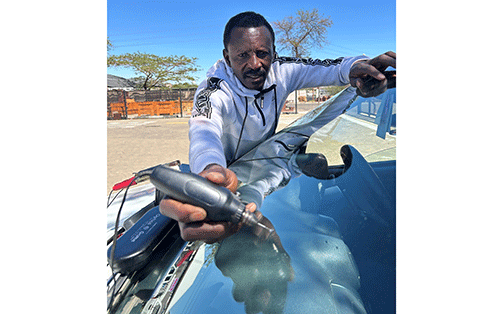“We need the national budget to enable small businesses to grow so that we can train more people and employ more people. This way the economy will also be able to grow,” said Jeremia Matheas, a small business owner in Windhoek.
“We only hear about the budget, but we don’t see any of its benefits. We only hear those big figures, but we don’t see any opportunities for our people,” said Samuel Brandt (no relation), an unemployed artisan in Windhoek.
These two opinions from laymen in the capital indicate a general disconnect between ordinary Namibians and the national budget, which is scheduled to be reviewed on Monday, 28 October 2024, when the mid-term budget is tabled in Parliament by finance and public enterprises minister, Iipumbu Shiimi.
The mid-term review typically focuses on assessing the current financial year’s progress, so there are usually no significant expectations for major changes, unlike the comprehensive reprioritisation that occurs during the annual budgeting process.
Commenting on what to anticipate in the mid-term budget review, a local investment analyst said: “We don’t expect any major revisions to the budget that was released earlier this year. We can all agree that it showed a huge improvement in the fiscal trajectory of Namibia coupled with revenue growth across all sectors. Tax revisions to individuals and businesses as well as overall collections are encouraging.”
The analyst, who preferred speaking on condition of anonymity, added: “I think at this point any small positive revision will be embraced, with no complaints. If anything, maybe revisions will be focused on drought relief programmes, as well as additional spending on the social reforms not limited to minimum wage implementation. The reality around the upcoming elections may further see some positive allocations in necessary key spending to further entrench the social contract with the wider electorate.”
Also weighing in on the mid-term budget, local economist Josef Sheehama said although structural and some policy-related factors have caused economic activity to slow down, the decision to reform taxes makes financial sense.
“Additional economic slackness has been caused by low capital spending, a drop in aggregate demand, and a decline in investment as a result of high interest rates. This effect has grown as a result of actions taken to stabilize inflation and bolster foreign exchange reserves. Therefore, Namibia’s challenge is to achieve accelerated, pervasive and sustained economic growth. This is because other sectors, particularly mining and manufacturing, grew slowly as a result of lower uranium and diamond production,” he
stated.
In an opinion shared last week, Sheehama added that notwithstanding tax reform, a business-friendly environment should be created to boost the spirits of the private sector and attract both foreign and domestic capital and technology.
“These adjustments will increase output and productivity by increasing investment. The launch of this important economic reform programme will aim to drastically change the economy.
The primary objective of this programme is to reduce operating costs through increasing institutional strength, increasing efficiency, fostering competitiveness, and drawing in both foreign and domestic investment,” Sheehama added.
At the tabling of the 2024/25 national budget in February this year, Shiimi unveiled a N$100 billion plan, which is the biggest budget proposal the country has ever witnessed and he attributed that to strong revenue performance during the 2023/24 financial year. At the time the finance minister allocated more than N$44 billion to the social sector, which reflected a 12% increase. Shiimi also projected then that government’s income during 2024/25 would be just over N$90 billion.



